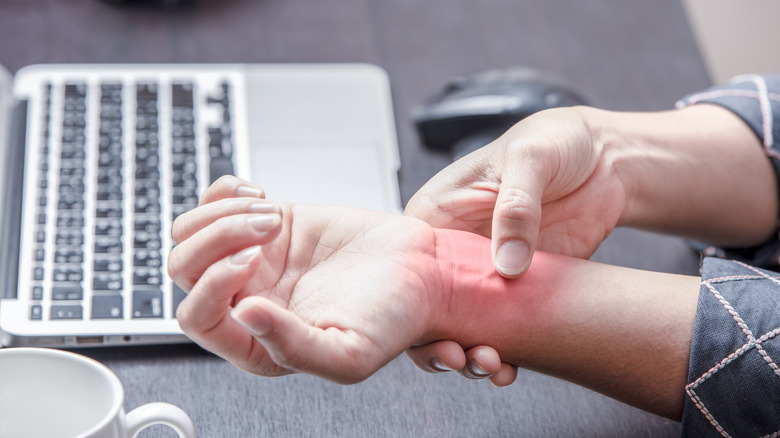What Does It Mean When You Pinch A Nerve?
Localized pain, numbness, muscle weakness, and other common health complaints are not always a sign of disease. Sometimes, these symptoms may indicate a pinched nerve, explains the National Institute of Neurological Disorders and Stroke (NINDS). Depending on the severity of your injury, you may also experience a feeling of pins and needles, neck or back pain, or loss of feeling in the affected area. The pain is usually due to inflammation or excessive pressure on the nerve root.
This type of injury occurs when a muscle, tendon, ligament, or other tissue is compressing a nerve. For example, herniated discs and bone spurs may compress the sciatic nerve, causing severe pain in the lower back and down the leg, notes the Mayo Clinic. This condition is called sciatica and tends to affect one side of the body. Similarly, it's possible to have a pinched nerve in your cervical or thoracic area, which can cause pain in the arm, shoulder, chest, or buttocks, according to the experts at Preferred SurgiCenter. Most people recover from this condition, but some may experience permanent damage to the nerve(s), warns NINDS.
What causes a pinched nerve and why is it so painful?
The nerves on your body can be compressed by the surrounding tissues. You then may feel a sharp pain that radiates to nearby muscles, causing weakness, numbness, and tingling. The pain and discomfort often worsen at night, says the Mayo Clinic. As the researchers note, this condition is more common in people who play sports or perform repetitive tasks, such as typing or painting.
Arthritis, obesity, and other disorders can lead to nerve compression, too. For example, excess weight can put pressure on the spine and nerves, which in turn may contribute to sciatica, per Spine Health. Nerve compression may also occur in people with diabetes. Clinical evidence suggests that about 25% of those suffering from this disorder have a pinched nerve in the wrist, per National Institute of Diabetes and Digestive and Kidney Diseases. Thyroid disease, overuse injuries, and pregnancy can further increase the risk of nerve compression, according to the Mayo Clinic.
Your symptoms may subside without treatment, but there are cases where a pinched nerve can lead to chronic pain and other complications, explains the Cleveland Clinic. Treatment usually consists of hot and cold therapy, rest, light exercise, and pain killers. If the nerve compression is due to an injury, you may need to wear a cervical collar, wrist splints, or back braces. Surgery is only recommended in severe cases where everything else has failed but always consult a doctor before doing any of the above.

